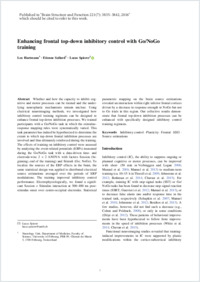Enhancing frontal top-down inhibitory control with Go/NoGo training
- Hartmann, Lea Neurology Unit, Department of Medicine, Faculty of Science, University of Fribourg, Switzerland
- Sallard, Eienne Neurology Unit, Department of Medicine, Faculty of Science, University of Fribourg, Switzerland
- Spierer, Lucas Neurology Unit, Department of Medicine, Faculty of Science, University of Fribourg, Switzerland
-
12.10.2015
Published in:
- Brain Structure and Function. - 2016, vol. 221, no. 7, p. 3835–3842
English
Whether and how the capacity to inhibit cognitive and motor processes can be trained and the underlying neuroplastic mechanisms remain unclear. Using electrical neuroimaging methods, we investigated how inhibitory control training regimens can be designed to enhance frontal top-down inhibition processes. We trained participants with a Go/NoGo task in which the stimulus–response mapping rules were systematically varied. This task parameter has indeed be hypothesized to determine the extent to which top-down frontal inhibition processes are involved and thus ultimately reinforced during the training. The effects of training on inhibitory control were assessed by analyzing the event-related potentials (ERPs) measured during the Go/NoGo task with a data-driven time- and electrode-wise 2 × 2 ANOVA with factors Session (beginning; end of the training) and Stimuli (Go; NoGo). To localize the sources of the ERP effects in the brain, the same statistical design was applied to distributed electrical source estimations averaged over the periods of ERP modulations. The training improved inhibitory control performance. Electrophysiologically, we found a significant Session × Stimulus interaction at 300–400 ms post-stimulus onset over centro-occipital electrodes. Statistical parametric mapping on the brain source estimations revealed an interaction within right inferior frontal cortices driven by a decrease in response strength to NoGo but not to Go trials in this region. Our collective results demonstrate that frontal top-down inhibition processes can be enhanced with specifically designed inhibitory control training regimens.
- Faculty
- Faculté des sciences et de médecine
- Department
- Médecine 3ème année
- Language
-
- English
- Classification
- Biological sciences
- License
-
License undefined
- Identifiers
-
- RERO DOC 277704
- DOI 10.1007/s00429-015-1131-7
- Persistent URL
- https://folia.unifr.ch/unifr/documents/305169
Other files
Statistics
Document views: 119
File downloads:
- Supplementary material: 176
- pdf: 395

